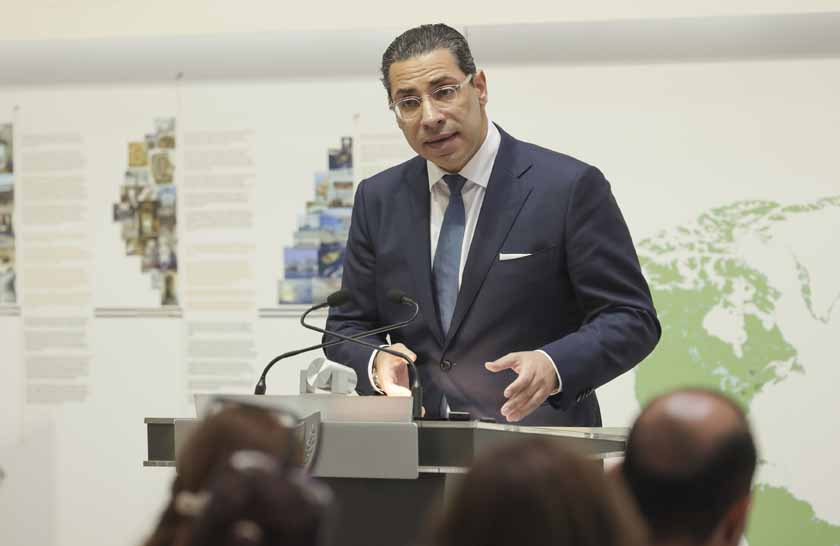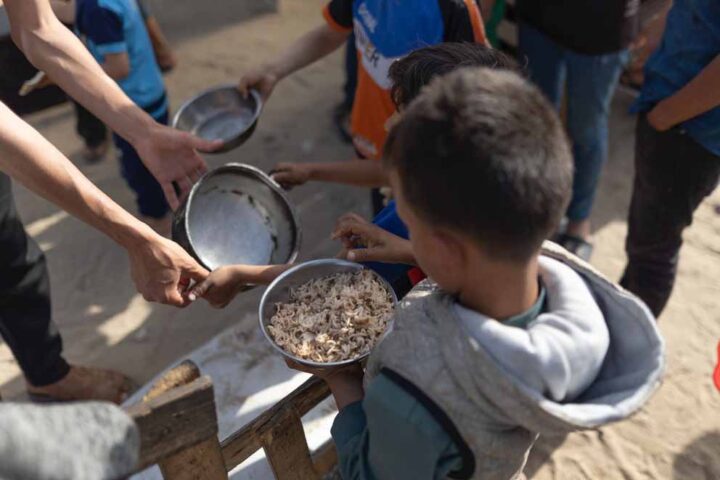Relief for the aid-stricken Palestinians in the Gaza strip could reach about 1,500 tonnes a week, once a U.S.-built jetty is operational, probably by the end of the month, according to the Cyprus Foreign Minister.
Speaking during a media briefing to mark his first year at the helm of the island’s diplomatic service, Constantinos Kombos said that despite the suspension of the World Food Kitchen shipments from Larnaca port, the ‘Amaltheia’ initiative will continue.
The NGO’s two ships set sail from Larnaca with food and supplies on board, but the aid corridor was suspended after seven aid workers from the charity were killed in an Israeli military strike on April 1.
The foreign minister said aid shipments will resume and that international donors have come forward to finance the infrastructure.
Already, the United Arab Emirates announced a donation of $15 mln to the Amaltheia Fund.
“This is something that actively demonstrates the trust of one of our key partners and we thank the UAE for the cooperation. This money will be used exactly for the purposes we mentioned. The fact is that, firstly, Cyprus is not alone in this effort, secondly, the basis of strength is being created, which will allow the continuation of this effort over time,” Kombos said.
“A plan was established for a humanitarian aid corridor, which would complement other existing initiatives. The sea passage, which helps lift the naval blockade of Gaza, is of particular importance. It has been recognised internationally, it has received strong support at the diplomatic and national levels.
“We had the visits of the President of the European Commission and the President of the European Parliament. We also hosted a Senior Officials Summit with the participation of 36 countries, four organisations, two entities and all this in addition to the international coverage that this initiative received with particularly positive comments.
“I would like to make special mention of the letter sent by U.S. President Biden to President Christodoulides, thanking him for the leadership of our side in this initiative.
“Two shipments have been sent. Unfortunately, on the second occasion, as you well know, we had the tragedy of the death of seven members of World Central Kitchen, which has shaken us. This is a very important partner in this whole effort. Respecting the grief of the specific organisation, the relatives of the victims, we wait patiently and without pressuring their decisions. Nevertheless, the effort continues.”
Benefits for Cyprus
Kombos said that establishing the aid corridor has had economic benefits for Cyprus as well.
“The implementation has, in addition to the transfer of humanitarian aid, benefits for the economy of the Republic. The Cypriot market has already been utilised for the cargoes that have departed and this is expected to continue in the future. An inter-ministerial committee has been set up so that this can be regulated in a way that is as helpful to the economy as possible.”
Describing the purpose of the Amaltheia Fund, running in parallel to the aid corridor, Kombos said, “the fund is structured according to international standards, with transparency and strong accountability. It will be managed by a Council with a management unit, implementation body, control body, with the aim of making purchases, securing vessels, purchasing services for the operation of the corridor, developing existing infrastructure of the Republic of Cyprus, securing equipment that will remain in Cyprus and support regarding the logistics aspect. All this is going to be about state contributions.”
On Cyprus’ role in regional humanitarian issues, the foreign minister said, “due to our geographical position and the good relations we maintain with countries in the region, Cyprus has consciously assumed a vital role, either as a coordinating centre or for the provision of emergency humanitarian aid.
“This was demonstrated by the recent repatriation of thousands of third-country nationals from Sudan, but also by the war in Gaza.
“In particular, the ESTIA project was activated twice in the last year. In April ’23 for Sudan. For 12 days, 2,611 citizens from 28 different countries were repatriated, including fourteen Cypriots. In October 2023, for Israel, with the repatriation of 1,088 civilians.
“And a huge-scale preparation for the possibility of having to evacuate from Lebanon, in the context of which more than 400 representatives from diplomatic missions participated, as well as military personnel from 25 countries, who operated through the ‘Zenon’ Joint Rescue Coordination Centre (JRCC).
“For all these cases, the Republic continues to receive praise from the international community and our role as a regional security centre in times of crisis is actively highlighted,” Kombos concluded.










